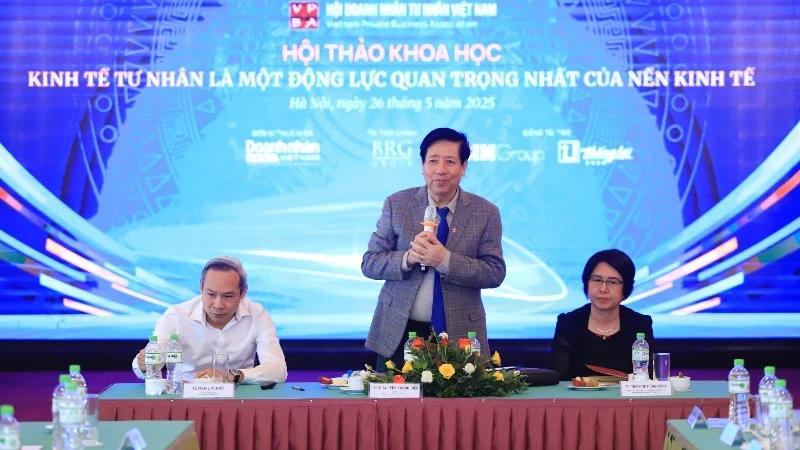Institutional breakthrough for private economy to grow
Economic experts have assessed that, with the contents expressed in Resolution No.68-NQ/TW of the Politburo, for the first time in history, the private economy is given the responsibility of being “the most important driving force of the economy”.

However, in order to put the Resolution into practice and effectively implement the tasks and solutions set forth in the Resolution, the contents of the Resolution still need to be studied, debated, discussed and exchanged, so that step by step, together with the political system, the people and entrepreneurs can raise awareness, thereby unifying action.
Those are also the opinions frankly shared by experts at a recently held workshop on private economy, the most important driving force of the economy chaired by the Vietnam Private Entrepreneurs Association.
“The starting gun” for the private economic revolution
In his speech at the workshop, Associate Professor, Dr. Nguyen Trong Dieu, Chairman of the Vietnam Association of Private Entrepreneurs, stated that Resolution No.68-NQ/TW of the Politburo on private economic development has been quickly welcomed by the entire political system, the entire population, and businesses.
This is a Resolution of great importance, opening a historical turning point to promote the breakthrough of the private economy. At the same time, Resolution No.68 is also considered the “starting gun” for a revolution not only in the private economy and the economy, but also in the national governance strategy, creating a prosperous future for the Vietnamese people.
Nguyen Thi Nga, Permanent Vice President of the Vietnam Association of Private Entrepreneurs and President of BRG Group, assessed that Resolution No.68 of the Politburo has looked directly at the reality of the private economic sector, from the great contributions of the private economy to GDP, budget revenue, job creation to inherent problems, causes and solutions.
In fact, the domestic private sector is losing its competitiveness and is at risk of losing itself at home, even though it still contributed nearly 60% to GDP, compared to about 20% of the FDI sector.
The FDI sector currently accounts for two third of Viet Nam’s export volume, mainly focusing on the processing and assembly stages with low added value, prioritising the exploitation of cheap labour resources rather than expanding and developing core business activities in Viet Nam. On the contrary, the private sector still has abundant potential, with a lot of room for development, from large enterprises to small and medium-sized groups.
According to Nga, Resolution No.68, along with other Resolutions in recent times such as Resolution No.57 on breakthroughs in science, technology, innovation and national digital transformation; Resolution No.59 on international integration in the new situation; Resolution No.66 on innovation in law-making and enforcement to meet the requirements of national development in the new era;... have brought great motivation, inspiration and confidence to business people in business development, contributing to the development of the country and fulfiling the social responsibility of each business person.
Putting the Resolution into practice soon
However, according to Nga, the full, comprehensive and scientific institutionalisation of Resolution No.68 still needs to be implemented methodically. This is the core element for Resolution No.68 to come into life, helping entrepreneurs feel secure in investing in business development, legitimately enriching themselves, and actively contributing to the overall development of the country to be worthy of the mission of being “the most important driving force of the economy”.
Associate Professor, Dr. Tran Dinh Thien, former Director of the Vietnam Economic Institute, member of the Prime Minister’s Policy Advisory Council, said that Resolution No.68 not only affirms but will shape the mission of entrepreneurs.
He shared that the Resolution will also change the attitude, policy mechanism for the private economic sector. With such an attitude and awareness, it can be said that the “golden hoop” for private enterprises has been removed. Along with that, state-owned enterprises can lead or accompany the private economy; together train and lead so that the private economic sector can grow even stronger.
Meanwhile, Dau Anh Tuan, Deputy General Secretary and Head of the Legal Department of the Vietnam Chamber of Commerce and Industry (VCCI), said that the most urgent issue at present is how to shorten procedures to get capital into the economy as quickly as possible.
According to Tuan, for a business to invest in land-use projects, it must go from general planning, zoning, to investment policy approval, investor selection, land procedures, land lease, etc. The procedures are currently very complicated, for example, related to the issue mentioned above, there are at least 15 procedures, not to mention many small procedures.
Tuan said that there are many procedures that can be reformed and adjusted immediately. Therefore, what businesses need is to reform the process, help businesses be more convenient, operate more easily and have a smarter management method. In the coming time, in addition to the very innovative spirit of Resolution 68, the specific actions of the National Assembly and the Government also need to be stronger to direct capital flows quickly into the economy.
Sharing the same view, Dr. Phan Duc Hieu, Standing Member of the National Assembly’s Economic Committee, acknowledged that implementing the Resolution requires the Government’s efforts and the cooperation of enterprises.
He also noted that previously, complicated procedures were a shield protecting enterprises from competition. Therefore, when procedural reforms become simpler, young and capable investors will enter the market, and competition will become fiercer. Therefore, if enterprises do not reform and improve their own capacity, they will be eliminated.








